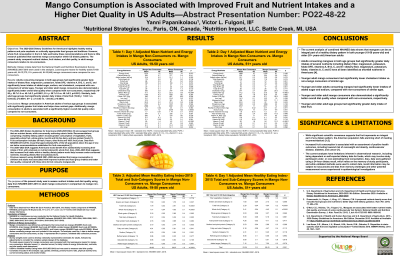Back

Objectives: The 2020-2025 Dietary Guidelines for Americans highlights healthy eating patterns and puts emphasis on culturally appropriate food groups and traditions. However, whole fruit consumption in the U.S. falls well below these recommendations and there is little research published that examines mango consumption within US dietary patterns. The present study compared nutrient intakes, fruit intakes, and diet quality, in adult mango consumers relative to non-consumers.
Methods: Dietary intake data from the National Health and Nutrition Examination Survey 2001-2018 were used in the analysis. Least square means for healthy adult (19-50 years-old, N=12,273; 51+ years-old, N=10,946) mango consumers were compared to non-consumers.
Results: Adults consuming mangoes in both age groups had significantly greater daily intakes of dietary fiber, magnesium, potassium, folate DFE, vitamins A, B12, C, and E, and significantly lower intakes of added sugar, sodium, and cholesterol, compared with non-consumers of similar ages. Younger and older adult mango consumers also demonstrated a significantly better overall diet quality when compared with non-consumers, respectively (19-50 y: 59.7±1.8 vs. 49.1±0.2, p< 0.0001; 51+ y: 59.7±1.8 vs. 49.1±0.2, p=0.001). Similarly, both adult age groups had significantly greater daily intake of total fruit (19-50 y: 1.9±0.1 vs. 0.9±0.02, p< 0.0001; 51+ y: 2.1±0.02 vs. 1.0±0.02, p< 0.0001).
Conclusions: Mango consumption in American adults of various age groups is associated with significantly greater fruit intake and helps close nutrient gaps. Additionally, mango consumption in adults is associated with a significantly higher overall diet quality when compared to non-consumers.
Funding Sources: Funded by the National Mango Board
Nutritional Epidemiology
(PO22-48-22) Mango Consumption Is Associated With Improved Fruit and Nutrient Intakes and a Higher Diet Quality in US Adults


Yanni Papanikolaou, MPH, PhD candidate
– President, Nutritional Strategies, Paris, Ontario, Canada- VF
Victor L. Fulgoni, III, Ph.D.
– Nutrition Impact, LLC, Battle Creek, Michigan, United States
Presenting Author(s)
Co-Author(s)
Disclosure(s):
Yanni Papanikolaou, MPH, PhD candidate: National Mango Board: Grant/Research Support (Ongoing)
Objectives: The 2020-2025 Dietary Guidelines for Americans highlights healthy eating patterns and puts emphasis on culturally appropriate food groups and traditions. However, whole fruit consumption in the U.S. falls well below these recommendations and there is little research published that examines mango consumption within US dietary patterns. The present study compared nutrient intakes, fruit intakes, and diet quality, in adult mango consumers relative to non-consumers.
Methods: Dietary intake data from the National Health and Nutrition Examination Survey 2001-2018 were used in the analysis. Least square means for healthy adult (19-50 years-old, N=12,273; 51+ years-old, N=10,946) mango consumers were compared to non-consumers.
Results: Adults consuming mangoes in both age groups had significantly greater daily intakes of dietary fiber, magnesium, potassium, folate DFE, vitamins A, B12, C, and E, and significantly lower intakes of added sugar, sodium, and cholesterol, compared with non-consumers of similar ages. Younger and older adult mango consumers also demonstrated a significantly better overall diet quality when compared with non-consumers, respectively (19-50 y: 59.7±1.8 vs. 49.1±0.2, p< 0.0001; 51+ y: 59.7±1.8 vs. 49.1±0.2, p=0.001). Similarly, both adult age groups had significantly greater daily intake of total fruit (19-50 y: 1.9±0.1 vs. 0.9±0.02, p< 0.0001; 51+ y: 2.1±0.02 vs. 1.0±0.02, p< 0.0001).
Conclusions: Mango consumption in American adults of various age groups is associated with significantly greater fruit intake and helps close nutrient gaps. Additionally, mango consumption in adults is associated with a significantly higher overall diet quality when compared to non-consumers.
Funding Sources: Funded by the National Mango Board

.png)
